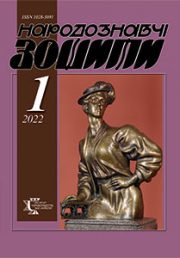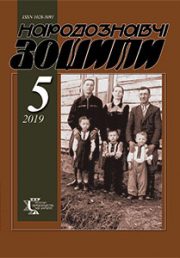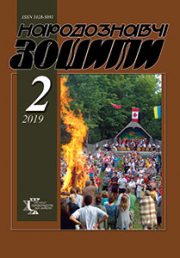The Ethnology Notebooks. 2025. № 4 (184), 1011—1018
UDK001:39](477.83)
DOI https://doi.org/10.15407/nz2025.04.1011
PROFESSOR ROMAN KYRCHIV IN MY MEMORY: THE HUMAN DIMENSION (TO THE SCIENTIST’S 95TH BIRTHDAY)
TARAS Yaroslav
- ORCID ID: https://orcid.org/0000-0001-7241-9466
- Doctor of Historical Sciences, Professor,
- Institute of Ethnology of the National Academy of Sciences of Ukraine,
- Head of the Modern Ethnology Department,
- 15, Svobody Avenue, 79000, Lviv, Ukraine;
- Lviv Polytechnic National University,
- Department of Architecture and Conservation,
- 12, Banderу street, 79013, Lviv, Ukraine,
- Contacts: e-mail: etnomod@ukr.net
Abstract. The relevance of the article is due to the fact that this year Professor Roman Kyrchiv would have turned 95. This is an important occasion to recall the scientist who made a significant contribution to the study of folklore and ethnology. Today, it is relevant to involve in the scientific heritage of the memories of professor Kyrchiv of people who worked with him, communicated not only on scientific topics, but also beyond them. We are talking about everyday life, which has always been a component of science. This is relevant for understanding how the scientific achievements of the scientist took place, in what environment the professor lived and worked.
The object of the study was the everyday life of professor Roman Kyrchiv.
The subject of the study covers the history of Roman Kyrchiv’s life path, a layer that existed alongside the scientific one and, due to certain stereotypes, is not always covered.
The purpose of the article is to find out the human factor and recreate the everyday life in which Roman Kyrchiv lived and worked.
The source base of the work is the memoirs of Yaroslav Taras, daughter Natalka about Roman Kyrchiv.
Methodological research is based on the principles of systematicity and objectivity.
The article takes a place in the coverage of the Kyrchiv’s parental estate in the village of Korchyn, his memoirs about the family.
This concerns his stay at the Institute of Ethnology, work in the department of contemporary ethnology, academic defense councils and the Shevchenko scientific society.
Attention is drawn to his nobility in communication and attitude to work.
The focus is on his manuscripts and communication be havior.
Keywords: Roman Kyrchiv, folklore studies, ethnology, Institute of Ethnology of the NAS of Ukraine, Korchyn, Galicia.
Received 22.07.2025
REFERENCES
- Kyrchiv, R., & Yablonska, V. (comp.) (2010). Roman Kyrchiv (on the occasion of his 80th birthday): Bibliographic index. Lviv [in Ukrainian].
- (2010). To the Roman Kyrchiv’s 80th anniversary The Ethnology notebooks, 1—2 [in Ukrainian].
- Diakiv, V. (2015). The multi-vector nature of humanist scientist Roman Kyrchiv (Word about the Teacher). The Ethnology notebooks, 2, 321—326 [in Ukrainian].
- Demian, H.V. (2018). Kyrchiv Roman Fedorovych (Original work published 2013). In: I.M. Dziuba, A.I. Zhukovsky, M.H. Zhelezniak. Encyclopedia of Modern Ukraine (Vol. 13). Kyiv: The NASU Institute of Encyclopedic Research. Retrieved from: https://esu.com.ua/article-6514 [in Ukrainian].
- (2012). And those mountains of ours became a stronghold for us in the fierce time…: Memories of the typist of the Main Propaganda Center of the OUN and the UPA Daria Malyarchyn-Shpytal. Lviv [in Ukrainian].
- Kyrchiv, P. (2015). Images from Galician everyday life. Lviv [in Ukrainian].
- (2005). Echoes of the Holodomor-Genocide of 1932—33. Ethnocultural Consequences of the Holodomor. Lviv: Shevchenko scientific society [in Ukrainian].
- Kyrchiv, R. (2020). How they tried to enlist me. Istorychna Pravda. Retrieved from: https://www.istpravda.com.ua/articles/5ecd039694eb4/ [in Ukrainian].






